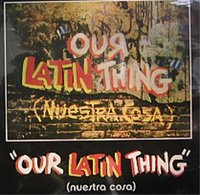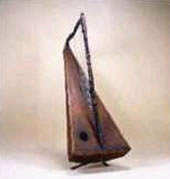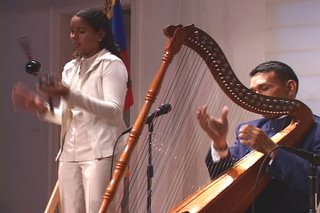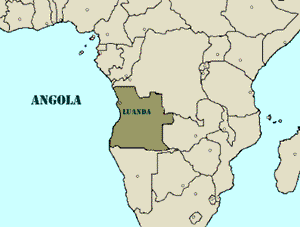Latino Take on Things
 This post is the resume of what I wrote in answer to the online magazine PopMatters the last year, when they were looking for someone to give a ideas and write for a section of the magazine called "Latino take on things"
This post is the resume of what I wrote in answer to the online magazine PopMatters the last year, when they were looking for someone to give a ideas and write for a section of the magazine called "Latino take on things"Once I started reading the PopMatters advertisement, I was not so sure whether to write to them or no, It is because the word “LATINO” has different interpretations even for people from South America, to give an example when one mentions Latin music in USA people tend to think about music made by central and south American immigrants in the USA. However, when one says Latin music in Brazil they think about Salsa and Merengue but not Brazilian music, Argentineans have a similar vision than the Brazilians but wait a second Argentineans do speak Spanish. So that the Latin Thing does not depends on the language, I personally think that being LATIN is a way of living and it does have to be encapsulated by any stereotype. If any reader wishes to expand a bit about this topic, it is advisable to check on the literature the two books by Ed Morales and other authors or even check on the web. Of course, it would be also very interesting if any of the readers leave his comments.
Returning to the draft I sent to the people of PopMatters, I could say that the idea of my possible column was inspired by the successful radio program by Cristobal Guerra, “Cronicas de Juglares”, which was online in FM104.5 in Venezuela, during 1993-1995.
This is an extract of what I wrote:
“Music from Poets”
The column will be about Latin songwriters basically there is a vast amount of Latin songwriters who are singers as well, in Spanish and Portuguese we called the “cantautores” some of the most representative are Joan Manuel Serrat (Spain), Chico Buarque (Brazil), Gilberto Gil (Brazil), Caetano Veloso( Brazil), Silvio Rodriguez (Cuba), Yordano di Marco (Venezuela), Franco de Vita (Venezuela) , Ricardo Arjona (Guatemala), Altahualpa Yupanki (Argentina), Carlos Mejias Godoy (Nicaragua), Aterciopelados (Colombia), Ruben Blades (Panama), Desorden Publico (Venezuela), Juan Luis Guerra ( Rep. Dominicana) and many more. The latest list are strongly influenced by my personal taste, but no means it would be restricted only to those artists.
The most remarkable characteristic of these “catautores” is that they all want to express their feeling throughout the art of music, this art which can be seem as poetry as well is based on their memories, social environments, love, death, fiction, magical realism and etc.
At the moment I have written just about names and songs topics, let’s talk about music genre, these guys can express theirs ideas by using a whole gamut of Latin and international styles which go from , Salsa, Ska, Tango, Samba, MPB (Brazilian popular music,) Rock, Zamba (style of music from Argentina), Joropo (Venezuelan traditional music), Bossa Nova, “Nueva Trova Cubana”, Tex-Mex music, Reggae, Pop, Folk, Blues, Cumbia, Bayenato, Son, Guaguanco, Calypso, Rock and so on.
As we can see there is a very wide spectrum of choices to describe Latin Music and the pseudo called Latino culture but any of those choices will deliver a piece of the Latin people from the Latino perception to the PopMatters’ readers.
In the column, I would like to bring out several topics, I will not be written about all the topics each time, it would depend on who or whom I am writing about or any major event such as concert, demonstration, movie premiere, CD release, social problems and etc.
Some examples of how I could fulfil the expectatives of the PopMatters editors and reader,
Social problems: Does he express a political or social concern about Latin people? for instance, Ruben Blades plays Salsa in a very unique style because he has managed to do what he wants without following the desires of any big record company, He is not only able to gives us very good music to have a hot Latin party but also he is able to describe social problem in Latin America. He is a good example of an artist who can sell millions of CDs without having to betray his art, he is also a Hollywood start.
Cultural background: The artist or group must have a well define style due to their roots, for instance Atahualpa Yupanki was a very prestigious “cantautor” from Argentina, he was born in the north of Argentina where only a few aborigines were left after the genocide caused by the European-Argentinean on the beginning of the twenty century.
Books: Chico Buarque(Brazil) has left the music apart to write poetry books, I could be easily writing about his books are how it does focus in other issues.
Movies: A good example is the Brazilian movie “ City of god” (Cidade de Deus), the soundtrack of this movie is terrific, I know terrific is not a good word to describe a soundtrack, but let me explain you wait I said so, when I fist heard that sound track I felt like an ignorant person because this music was unknown for me and for most of my Venezuelans country men, however a few minutes after I said to myself wait a second I know this tune and that one; in fact some of then were some re-mix of well known Brazilians tunes but the rest were not, it made me go and search in internet, talk to the guys in the local CD shop about the singers/groups which I did not know anything about .. after a few days eureka I was able to say, I do know about them. The experience describe above is a good example of things I would be writing , I would talk about the movie, its soundtrack as well as the new singers/groups, The idea is to share this information the readers,
Interview: Chatting with a friend of mine about Joan Manuel Serrat (Spain), he told me “ I have read an interview about J. M. S where he was asked which language do you prefer to sing in Spanish or Catalan, Serrat answered the anyone forbids me to sing”. If I were a writer for PopMatter I would explain to the readers about Serrat roots, music genre, historic facts and so on.
Quotations: Elis regina (Brazil) once was asked about Milton Nascimentos another Brasilian “cataautor”, she just said “If good could speak he will have Milton’s voice”. This exampel will give me the opportunity of talking about both singers.
CD analysis: Any time that one of our favourite singers releases a new one, we can describe it or analyse it from our perspective.
.......................................................................................................................................................................
In retrospective, I may use this draft for the column to use as a template for the forthcoming post in this blog.
Cheers!!!
Larry



